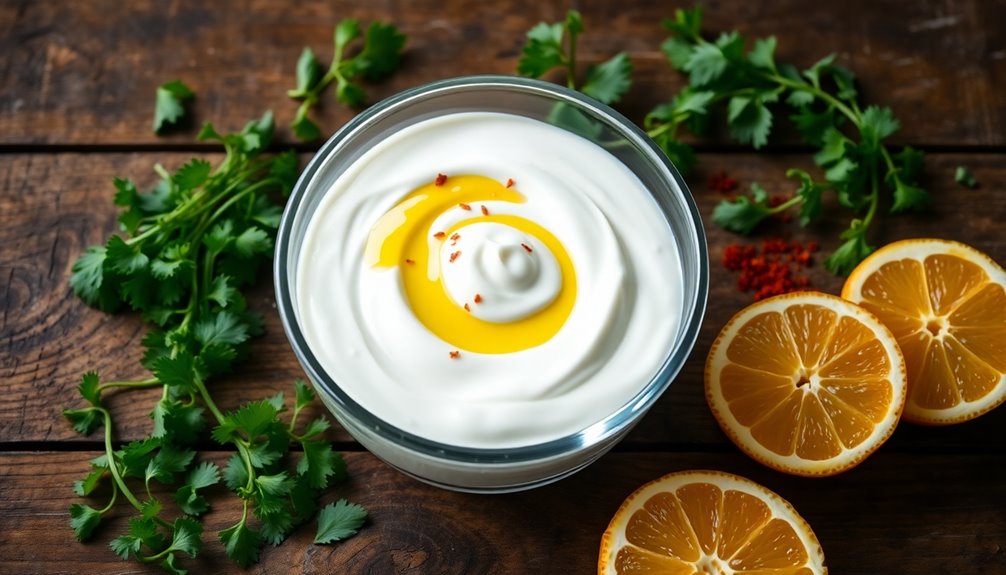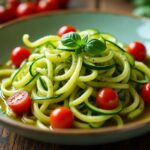Using dairy-free yogurt for marinades can enhance your dish with its creamy texture and tangy flavor. It's a great choice for those avoiding dairy, while still providing a rich, flavorful base. Look for options like coconut or almond yogurt that are high in protein and probiotics. Combine the yogurt with herbs, spices, and acidic elements like lemon juice to enhance flavor and tenderize meats or vegetables. For best results, let your ingredients marinate for at least 30 minutes. You might discover fascinating combinations that could transform your culinary creations as you explore more about this versatile ingredient.
Key Takeaways
- Dairy-free yogurt adds creaminess and tang, enhancing the overall flavor of marinades.
- It tenderizes proteins due to its lactic acid content, making meats and veggies succulent.
- Popular dairy-free options like coconut, almond, and cashew yogurt can be used for diverse flavors.
- Be cautious of added sugars and preservatives when selecting dairy-free yogurt for marinades.
- Experiment with spices and acids to create unique and vibrant marinade profiles.
Benefits of Dairy-Free Yogurt
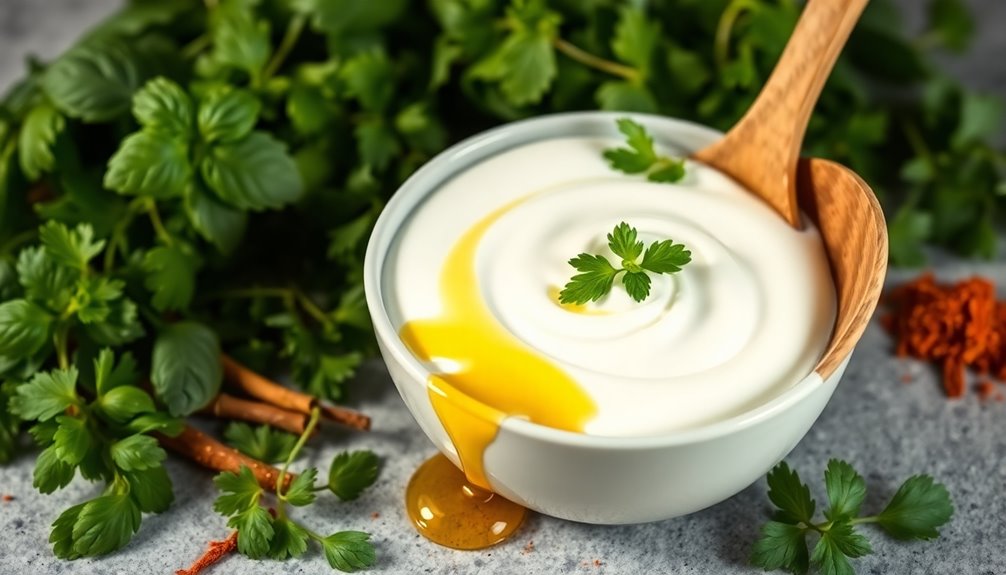
Many people are discovering the advantages of using dairy-free yogurt, especially when it comes to marinades. This ingredient not only adds a creamy texture but also enhances flavor profiles while being a healthier option. When you choose dairy-free yogurt, you're tapping into a variety of plant-based alternatives that cater to different dietary preferences, making it easier to create inclusive meals for yourself and others.
One of the standout benefits is the availability of probiotic-rich options. These yogurts often contain live cultures that can support gut health, which is a significant advantage over traditional dairy. Incorporating these probiotic-rich dairy-free yogurts into your marinades can transform your dishes while promoting digestive wellness. You're not just tenderizing meat or enhancing veggies; you're also contributing to your overall health.
Moreover, using dairy-free yogurt can help you avoid common allergens found in dairy products. This inclusivity means that whether you're hosting friends with dietary restrictions or simply looking to make healthier choices for yourself, you can feel confident in your cooking. Additionally, many plant-based alternatives are made from nuts, soy, or coconut, offering diverse flavors and textures that can elevate your marinades.
Incorporating dairy-free yogurt into your marinades isn't just a culinary trend; it's a practical choice that aligns with a growing movement toward healthier, more mindful eating. So go ahead, experiment with various flavors, and enjoy the benefits of this versatile ingredient in your kitchen.
Choosing the Right Yogurt
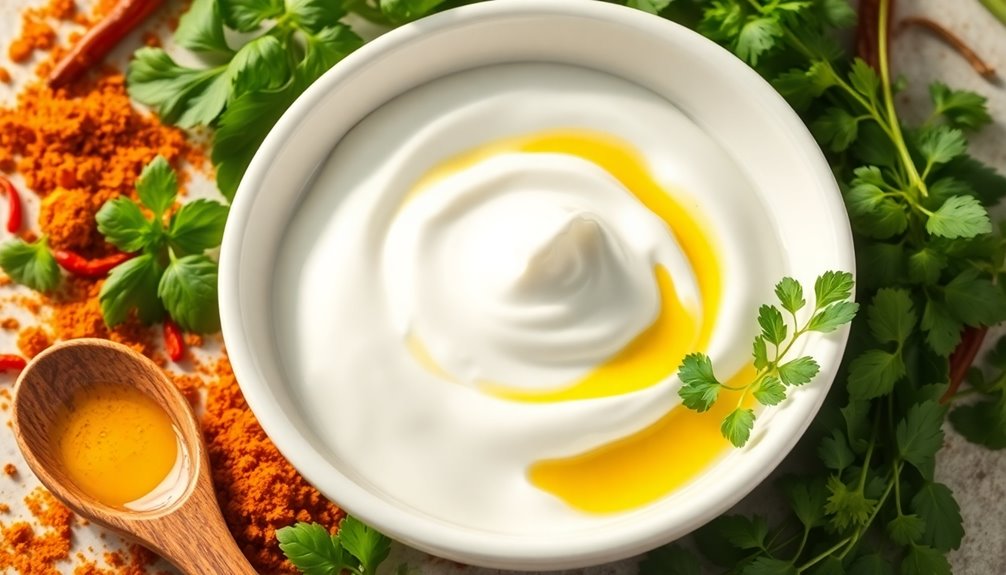
When it comes to selecting the appropriate dairy-free yogurt for your marinades, not all options are created equal. You'll want to focus on yogurt selection that enhances the flavors of your dish while providing the desired texture and acidity. Start by examining the base ingredient; coconut, almond, and cashew yogurts are popular dairy-free alternatives, each bringing distinct characteristics to your marinade.
Coconut yogurt, for instance, offers a creamy texture and a hint of sweetness, making it a great choice for tropical or Asian-inspired marinades.
Almond yogurt tends to be lighter and slightly nutty, perfect for Mediterranean dishes.
Cashew yogurt is another rich option, providing a smooth consistency that can elevate any savory or sweet marinade.
Next, consider the protein content in your yogurt selection. Higher protein yogurts can help tenderize meat more effectively, leading to a juicier end result. Additionally, check for live cultures; these probiotics not only contribute to a tangy flavor but also aid in the marinating process.
Lastly, be mindful of added sugars and preservatives. Opt for unsweetened varieties to maintain control over the flavor profile of your marinade. By taking the time to pick the right dairy-free yogurt, you'll make sure that your marinades aren't only delicious but also contribute to a wholesome, satisfying meal. Embracing these dairy-free alternatives allows you to create vibrant dishes that cater to your dietary preferences without sacrificing taste.
Flavor Combinations to Try
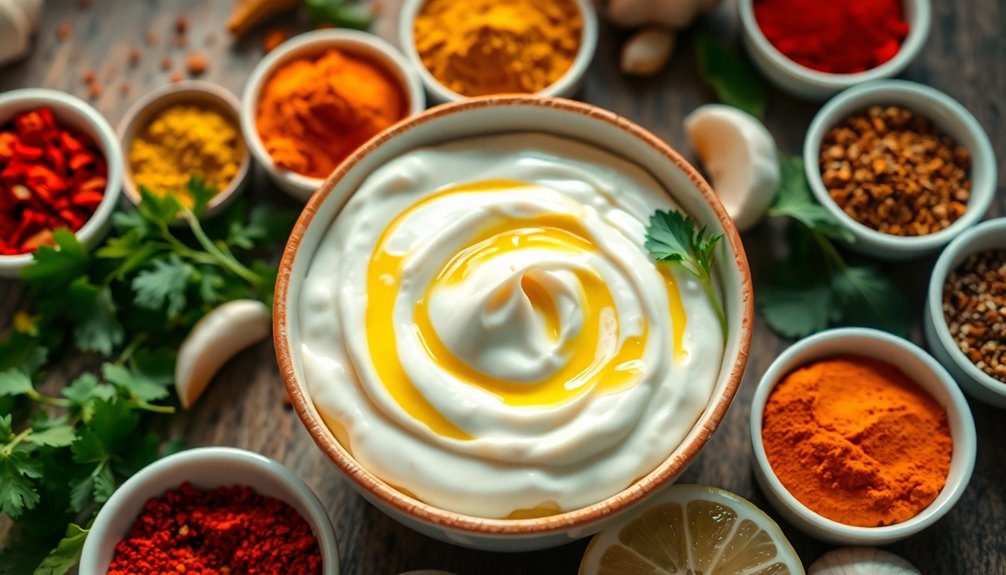
Exploring unique flavor combinations can elevate your dairy-free yogurt marinades to new culinary heights. By experimenting with sweet and savory pairings, you can create marinades that tantalize your taste buds and enhance your dishes.
For example, combining maple syrup with garlic and soy sauce offers a delightful contrast that works beautifully with grilled vegetables or tofu. The sweetness of the maple syrup balances the umami flavors, creating a marinade that's both intricate and satisfying.
In addition to sweet and savory combinations, consider utilizing exotic spice blends to infuse your marinades with depth and character. A mix of cumin, coriander, and smoked paprika can transform a simple yogurt marinade into a flavor-packed experience. This blend pairs well with proteins like chicken and fish, allowing the spices to seep into the meat and elevate its natural flavors.
You might also try a Moroccan-inspired blend, incorporating cinnamon, turmeric, and ginger. This aromatic combination not only enhances your yogurt marinade but also adds warmth and richness, making your dishes stand out.
Don't shy away from mixing in fresh herbs like cilantro or mint, which can brighten your marinades and create an invigorating finish. By embracing these flavor combinations, you'll find that your dairy-free yogurt marinades become an integral part of your culinary repertoire, allowing you to connect with and delight those you share your meals with.
Marinade Techniques and Tips
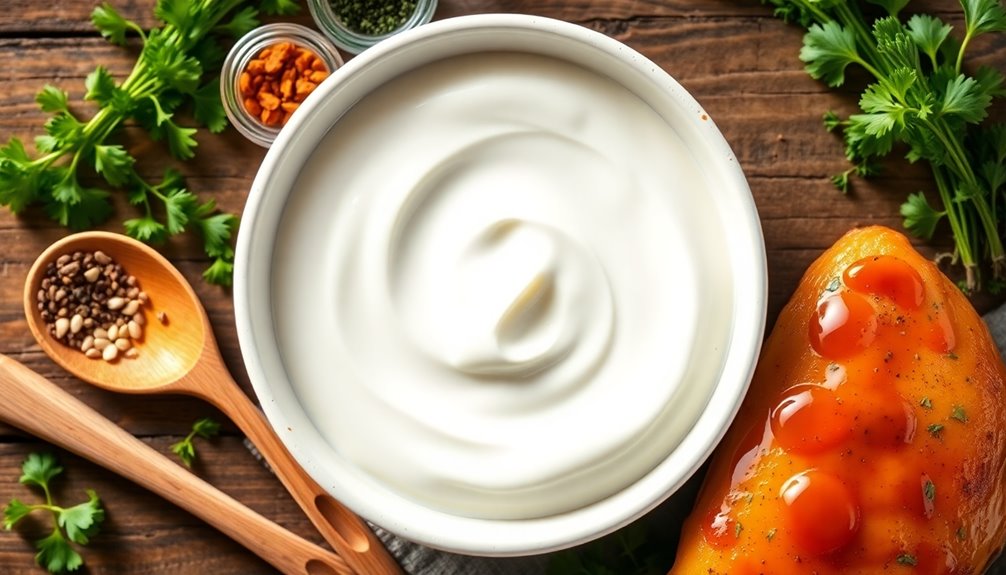
How can you ensure your dairy-free yogurt marinades deliver the best flavor and texture? Start by mastering a few key marinade techniques and tips that'll elevate your dishes. The secret lies in infusing flavors deeply into your ingredients while utilizing effective grilling techniques.
Here's a simple guide to help you:
| Marinade Ingredient | Purpose |
|---|---|
| Dairy-Free Yogurt | Provides creaminess, tang |
| Acid (e.g., lemon juice) | Breaks down proteins, adds brightness |
| Herbs & Spices | Enhances aroma and taste |
To achieve maximum flavor, let your protein or veggies marinate for at least 30 minutes, but ideally a few hours or overnight. This allows the dairy-free yogurt to penetrate and infuse flavors thoroughly. When you're ready to grill, lastly your grill is preheated to the right temperature to create those beautiful char marks while sealing in moisture.
When applying your marinade, don't just coat the surface; use a brush or your hands to massage it into every crevice. This is particularly effective for thicker cuts of meat. Lastly, experiment with varying acidity levels and herbs to find your unique flavor profile.
Dairy-Free Yogurt and Tenderizing
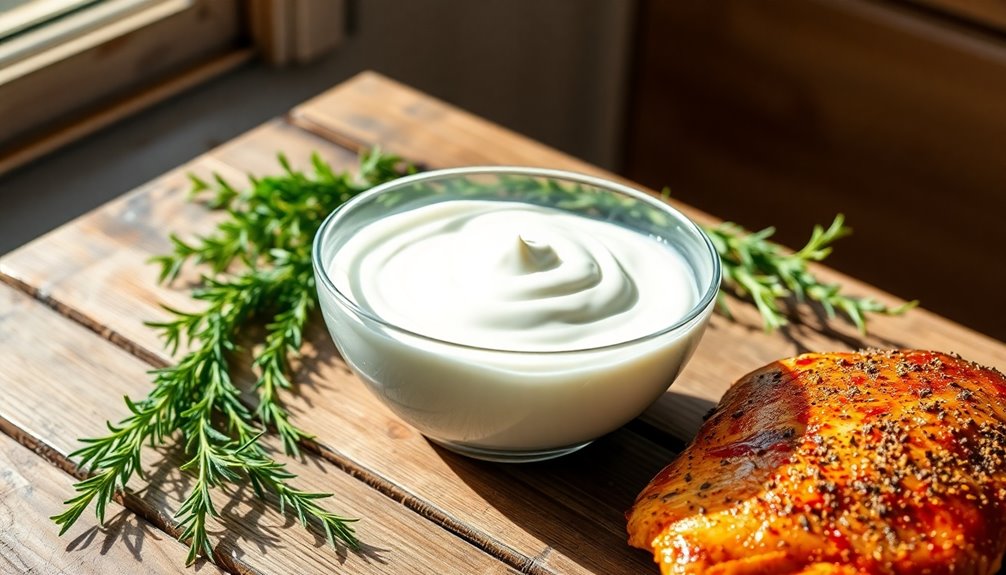
While mastering marinade techniques enhances flavor, it's equally important to understand how dairy-free yogurt can tenderize your ingredients. This is especially relevant for those of you exploring yogurt alternatives in your cooking without dairy.
The creamy texture and acidic nature of dairy-free yogurt, derived from sources like almond, coconut, or soy, make it an excellent choice for breaking down tough proteins in meats and vegetables.
When you apply dairy-free yogurt in your marinades, the lactic acid plays a pivotal role. It helps to denature proteins, which results in a more tender texture. This is particularly beneficial for tougher cuts of meat, as the yogurt penetrates the fibers, making them softer and more palatable. Additionally, the fat content in yogurt alternatives contributes moisture, preventing the meat from drying out during the cooking process.
Another advantage of using dairy-free yogurt is its ability to infuse flavors deeply. As the yogurt interacts with your chosen spices and herbs, it creates a rich coating that not only enhances taste but also improves tenderness. This makes it ideal for marinating chicken, beef, or even tofu, ensuring that each bite is succulent.
Incorporating dairy-free yogurt into your marinades allows you to embrace cooking without dairy while achieving beautifully tender results. So, whether you're preparing a weeknight dinner or a special gathering, consider this versatile ingredient for your next marinade adventure.
Recipes for Vegetable Marinades
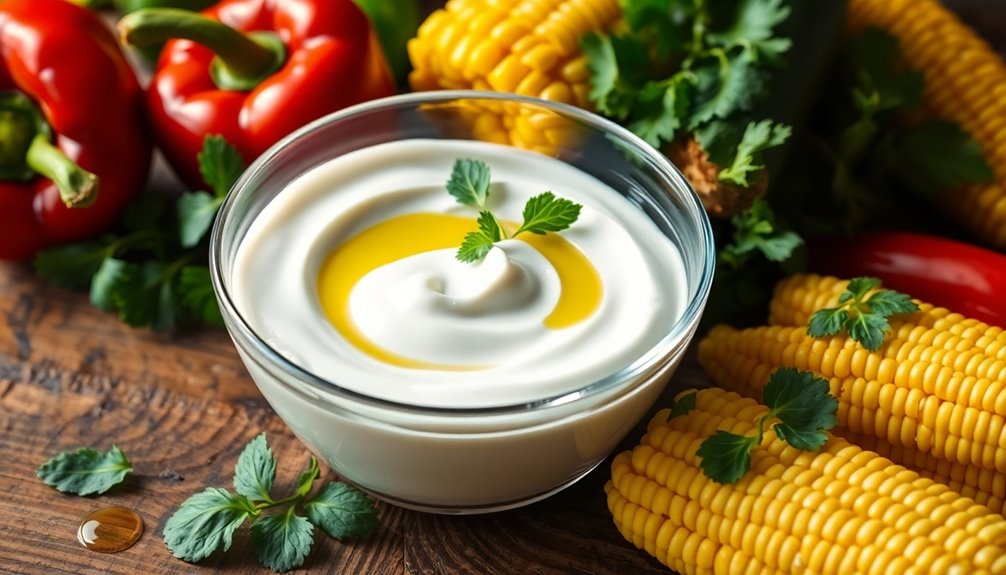
Creating flavorful marinades for vegetables can elevate your dishes and enhance their natural tastes. When you combine dairy-free yogurt with vibrant ingredients, you create a tangy base that complements grilled veggies beautifully. Here are some marinades that incorporate citrus herbs to bring out the best in your vegetables.
| Marinade Type | Ingredients |
|---|---|
| Citrus Herb Blend | 1 cup dairy-free yogurt, 2 tbsp lemon juice, 1 tbsp olive oil, 2 tsp mixed herbs (oregano, thyme) |
| Spicy Garlic Citrus | 1 cup dairy-free yogurt, 1 tbsp lime juice, 2 cloves minced garlic, 1 tsp chili flakes, 1 tsp cumin |
| Sweet Citrus Glaze | 1 cup dairy-free yogurt, 2 tbsp orange juice, 1 tbsp maple syrup, 1 tsp rosemary |
| Zesty Herb Vinaigrette | 1 cup dairy-free yogurt, 1 tbsp apple cider vinegar, 1 tbsp lemon zest, 2 tbsp fresh basil |
To use these marinades, simply toss your choice of vegetables—like bell peppers, zucchini, or eggplant—into the mixture and let them marinate for at least 30 minutes. The dairy-free yogurt tenderizes while the citrus herbs infuse the veggies with bright flavors. After marinating, grill them to perfection for a delicious side or main dish that everyone will enjoy.
Experiment with different herbs and spices to find your perfect combination. The key lies in balancing the acidity of the citrus with the creaminess of the yogurt for a mouthwatering experience. Enjoy your culinary journey with these delightful marinades!
Tofu Marinade Ideas
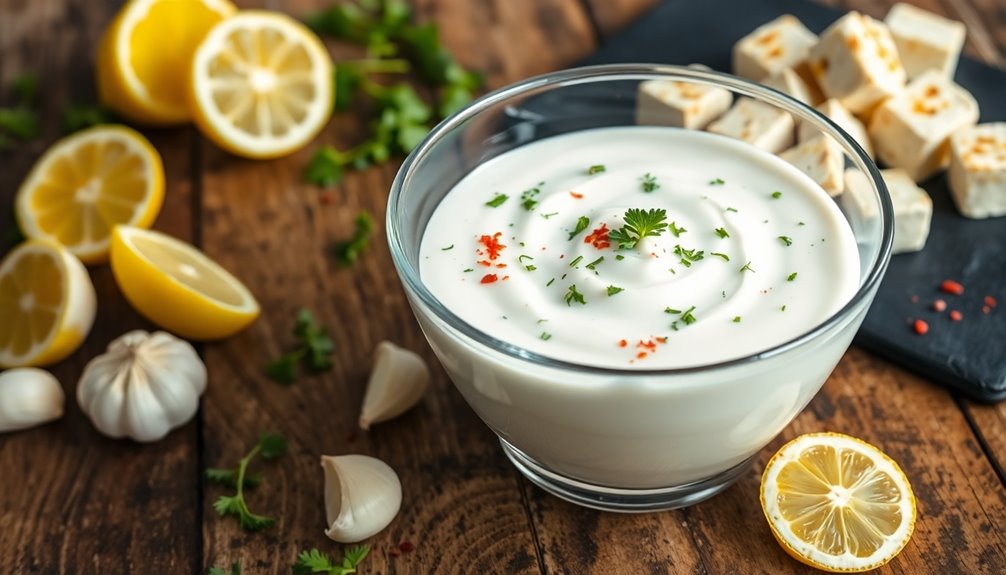
Marinades aren't just for vegetables; they can work wonders with tofu as well. Tofu is a blank canvas that absorbs flavors beautifully, making it an excellent choice for experimentation. When you're ready to immerse yourself in tofu grilling, consider using dairy-free yogurt as a base for your marinade. Yogurt seasoning not only adds creaminess but also tenderizes the tofu, enhancing its texture and flavor.
Start with a simple marinade by combining dairy-free yogurt with garlic, lemon juice, and your favorite herbs. This blend infuses the tofu with freshness while the acidity breaks down its protein structure, resulting in a more succulent bite.
If you're aiming for something with a kick, try a spicy marinade using yogurt, chili powder, and cumin. This will give your grilled tofu an exciting flavor profile that pairs perfectly with a side salad or grain dish.
For a sweet and savory twist, mix dairy-free yogurt with maple syrup, soy sauce, and ginger. This combination creates a delightful glaze during tofu grilling, caramelizing beautifully when cooked.
Don't forget to let your tofu marinate for at least 30 minutes to fully absorb the flavors, but an overnight soak will yield even better results.
Incorporating yogurt seasoning into your tofu marinades opens up a world of culinary possibilities. It's not just about providing flavor; it's about creating a satisfying experience that you can share with friends and family around the grill. So, get creative and enjoy the delicious transformations that come from marinating tofu!
Meat Marinades With Yogurt
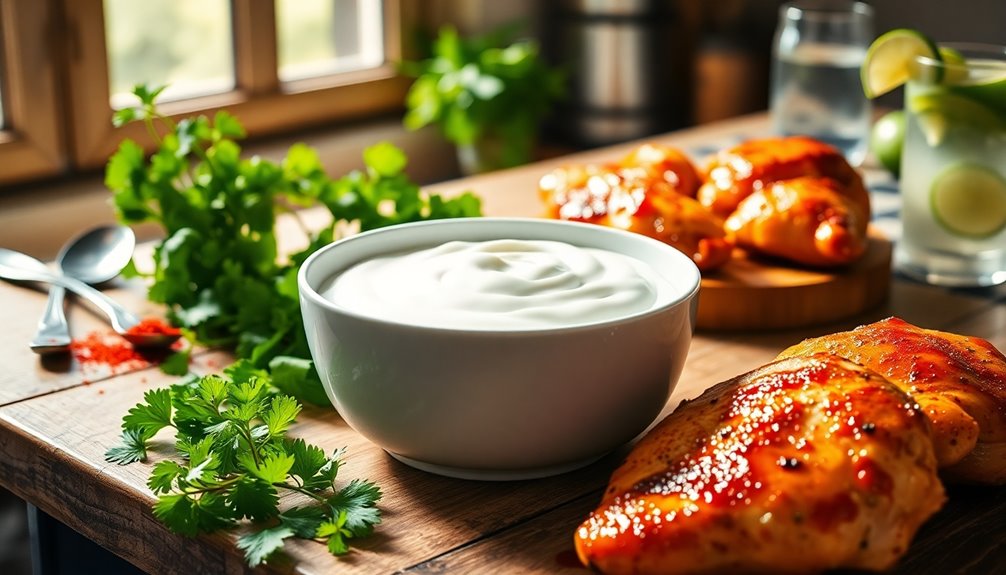
Using yogurt as a marinade for meat can elevate your grilling game greatly. It not only tenderizes the meat but also infuses it with rich flavors. Dairy-free yogurt offers a fantastic alternative for those who are lactose intolerant or simply prefer plant-based options. Here are three benefits of using yogurt in your marinades:
- Tenderization: The lactic acid in yogurt breaks down proteins, making your meat exceptionally tender, especially for cuts like chicken or lamb.
- Flavor Infusion: Yogurt serves as a base that allows spices and herbs to cling to the meat better, enhancing the overall flavor profile. You can mix in your favorite herbs and spices for a personalized touch.
- Moisture Retention: When grilling, keeping your meat moist can be challenging. Yogurt helps lock in moisture, ensuring your grilled dishes remain juicy and flavorful.
When using yogurt as a marinade, consider your grilling techniques. A longer marination time—ideally overnight—will yield the best results, allowing the flavors to penetrate deeply. You can also experiment with alternative ingredients like citrus juice, garlic, or ginger to complement the yogurt's tanginess.
Incorporating yogurt into your meat marinades not only opens up a world of flavor possibilities but also aligns with healthier cooking methods. Embrace these techniques, and you'll create dishes that leave your friends and family craving more. Happy grilling!
Storing and Using Marinades
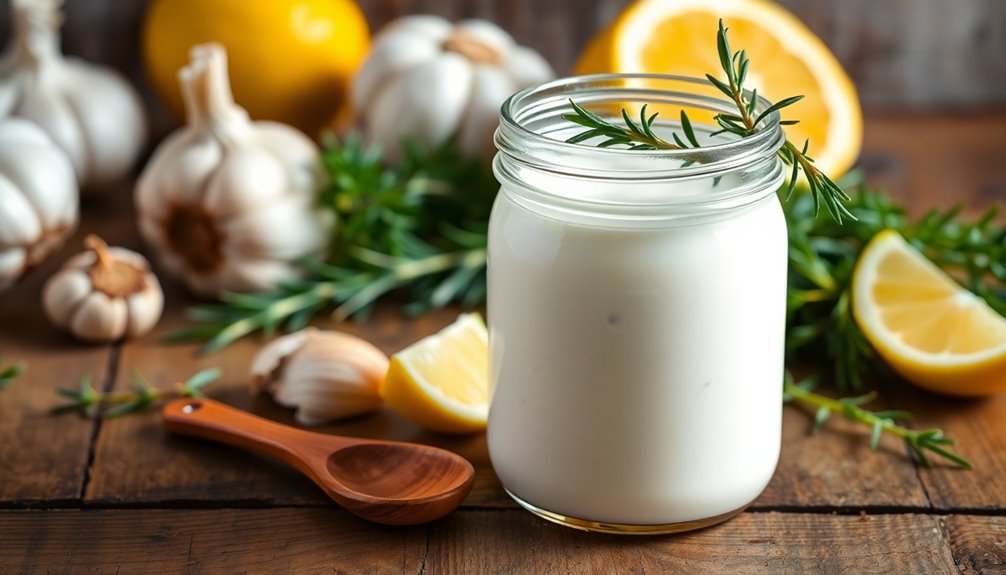
Proper storage and application of marinades can greatly impact the flavor and safety of your grilled dishes. To [GUARANTEE] you maximize the taste while minimizing health risks, follow a few key guidelines.
First, store any unused marinade in an airtight container in the refrigerator. This will help preserve its freshness and prevent bacterial growth. Remember, if you've marinated raw meat in a particular batch, you shouldn't reuse it without cooking it first. This is [ESSENTIAL] for food safety.
When it comes to marinade application, timing is everything. For most meats, aim for a marinating period of 30 minutes to several hours, depending on the type of protein. Delicate proteins, like fish, require less time, while tougher cuts of meat, such as beef or pork, can benefit from longer marination. However, be cautious—over-marinating can lead to a mushy texture, especially with acidic ingredients.
If you're using dairy-free yogurt as a base for your marinade, its thick consistency can help the flavors adhere better to the meat. This not only enhances the taste but also contributes to a more tender texture when cooked.
Always allow your marinated meat to rest at room temperature for about 30 minutes before grilling. This helps the marinade penetrate further and allows for even cooking. By following these practices, you'll [GUARANTEE] that your grilled dishes are flavorful, safe, and satisfying to share with friends and family.
Creative Serving Suggestions
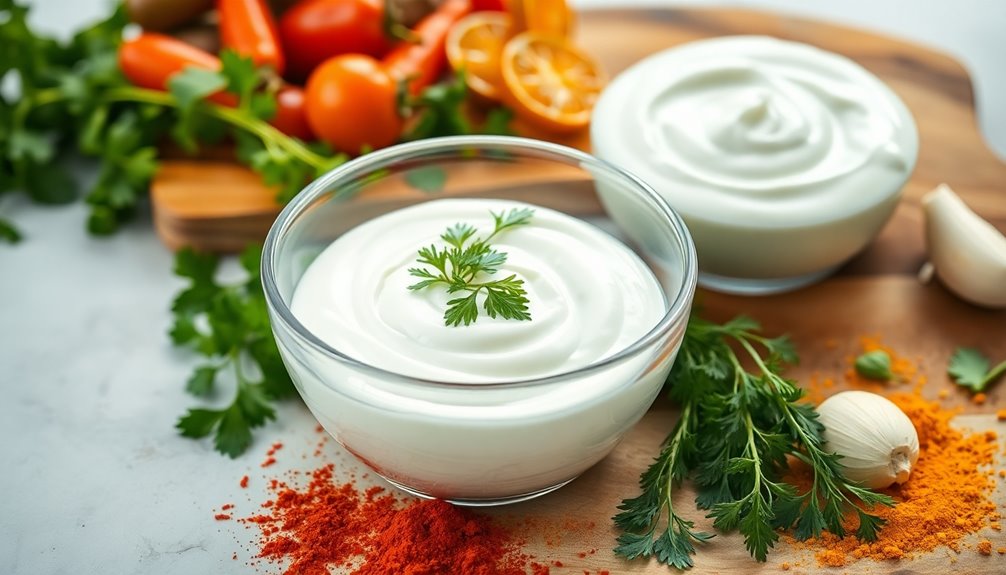
When it comes to serving dishes marinated in dairy-free yogurt, presentation plays a pivotal role in enhancing the dining experience. You want to create a feast for the eyes, making your meals not just delicious but visually appealing as well. Here are some creative serving suggestions to elevate your yogurt-marinated dishes:
- Yogurt Bowl: Layer your marinated ingredients in a bowl, starting with a base of grains or greens. Add your yogurt-marinated protein on top, then finish with colorful vegetables, herbs, and a drizzle of yogurt dressing. This not only looks appealing but also allows for a mix of textures and flavors in every bite.
- Yogurt Dressing: Use your dairy-free yogurt as a base for a flavorful dressing. Combine it with herbs, spices, and a touch of lemon juice. Drizzle this over grilled vegetables or salads to tie the meal together. This adds a creamy element that enhances the overall taste.
- Skewers and Platters: Thread your yogurt-marinated proteins and vegetables onto skewers for a fun, interactive dining experience. Serve these on a platter with extra yogurt dressing for dipping. This encourages sharing and creates a communal atmosphere at the table.
Frequently Asked Questions
Can Dairy-Free Yogurt Be Used for Baking as Well?
Yes, dairy-free yogurt can definitely be used for baking. It serves as a great substitute for traditional yogurt or sour cream, adding moisture and tenderness to your baked goods. In various cooking applications, it also enhances flavor, especially in cakes and muffins.
Plus, it's a fantastic way to incorporate probiotics into your diet. So, if you're looking to experiment, give dairy-free yogurt a try in your next baking adventure!
Is Dairy-Free Yogurt Suitable for Gluten-Free Diets?
Imagine standing at a crossroads, where flavors unite and dietary needs intertwine.
You'll find that dairy-free yogurt alternatives are often gluten-free, making them suitable for your gluten-free recipes. However, it's pivotal to check labels, as some brands may contain gluten.
How Long Can I Refrigerate Homemade Dairy-Free Yogurt?
You can refrigerate homemade dairy-free yogurt for about one to two weeks. Proper yogurt storage is essential for maintaining its freshness and flavor. After making your homemade recipes, transfer the yogurt to an airtight container to prevent contamination.
Always check for any off smells or changes in texture before consuming. Keeping track of the date you made it will help guarantee you enjoy it at its best!
Does Dairy-Free Yogurt Have Probiotics Like Regular Yogurt?
Yes, dairy-free yogurt often contains probiotics similar to regular yogurt, depending on the fermentation process and added cultures. These probiotics provide various health benefits, such as improving gut health and enhancing your immune system.
When you opt for a dairy-free option, look for brands that specifically mention probiotic content on the label. This way, you'll confirm you're getting the beneficial bacteria your body needs while enjoying a delicious alternative to traditional yogurt.
Can I Freeze Dairy-Free Yogurt for Later Use?
Yes, you can freeze dairy-free yogurt for later use. To do this effectively, consider some freezing tips:
- Transfer it to an airtight container, leaving some space for expansion, or use ice cube trays for portioning.
- When you're ready to use it, thaw it in the refrigerator for best results.
- Remember, while freezing can extend storage options, the texture may change slightly, so it's ideal for smoothies or baking rather than eating plain.
Conclusion
So, as you whip up your dairy-free yogurt marinades, just remember: you're not only saving cows but also revolutionizing your culinary approach. Who knew that a humble cup of yogurt could turn your meals into gourmet masterpieces? With the right combinations and techniques, you'll be the unsung hero of the kitchen—while your friends wonder if you've secretly enrolled in a culinary school. Embrace the yogurt revolution; your taste buds (and the cows) will thank you!

